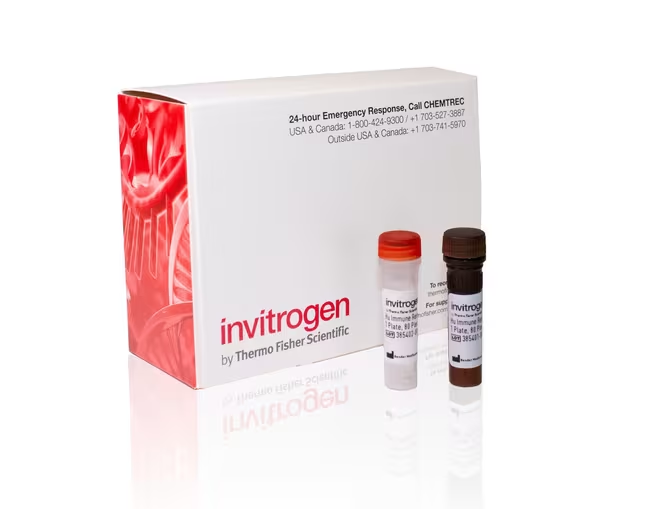
The QuantiGene Plex Mouse Virus-Host Panel, 50-plex, focuses on RNA targets relevant to respiratory virus infection biology in mouse models and includes targets related to immune response, viral infection process, cytokine storm, viral RNAs (SARS-CoV-2, influenza, respiratory syncytial virus/RSV), and more. This panel was functionally verified. If a particular target of interest is not included, a custom panel can be designed. Every new and custom panel is designed, built, validated, and shipped within three weeks of your order. This panel is used in combination with the QuantiGene Plex Assay Kit, which contains all buffers, plates, and detection reagents necessary to perform the assay in 96- or 384-well plates.
Features of the QuantiGene Plex Mouse Virus-Host Panel, 50-plex, include:
• True multiplexing—measure 50 genes of interest and housekeeping genes in the same well with no cross-reactivity
• Accommodation of difficult sample types—works with degraded and cross-linked RNA in FFPE tissues and blood
• Standardized platform—uses 96 or 384-well plate formats compatible with Luminex 200, MagPix, and FlexMap3D systems
• Simple workflow—employs an ELISA-like workflow with direct hybridization of transcripts to beads and transcript labeling
• Large inventory of validated targets— if additional targets need to be added to this panel, select from over 22,000 genes to create pathway and disease-themed panels
• Rapid turnaround for custom panels—if we don’t have your gene(s), we can create a custom panel within three weeks
QuantiGene Plex assays are hybridization-based assays for the direct quantitation of RNA directly from cell lysates, tissue homogenates, or purified RNA, and they enable the measurement of multiple targets in the same well via multiplexing. QuantiGene Plex assays contain two components: a target-specific probe set and magnetic capture beads. They use the target-specific probes to capture the RNA of interest, and branched DNA technology then amplifies fluorescent signals which are read with a Luminex xMAP instrument.
Targets: SARS-CoV-2 pan probe (orf1ab, Membrane Glycoprotein, Nucleocapsid), ORF3a, ORF7a, ORF8, RdRP/NSP12, S protein, TMPRSS2, ACE2, AT2, NF-κB, DPP4 (CD26), Envelope Protein, Influenza Pan Probe, RSV Pan Probe, CD4, CD8a, HLA-DR, CD38, CD25, CD14, CD19, RORc, TBX21, GATA3, NCAM1 (CD56), CD11d, IFITM1, CCL2 (MCP-1), CCL3 (MIP-1a), IFNg, Il12A, IL6, IL8a, IL1b, IFNa, Il10, IL2, TNFa, IL4, Granzyme B, IL18, IP10 (CXCL10), GM-CSF, IL17A (CTLA8), VEGF-A, GAPDH, GUSB, HPRT1, PPIB, RPL13A
Technology
QuantiGene Plex assays utilize branched DNA (bDNA) technology. First, cells (or blood) are lysed or tissue samples (including FFPE) are homogenized to release the target RNA. Second, the oligonucleotide probe set is incubated with the target RNA and Luminex xMAP bead set overnight. During this incubation, the probes cooperatively hybridize to the target and capture probes bound to each bead, capturing the target RNA. Third, signal amplification is performed via sequential hybridization of the bDNA preamplifier, amplifier, and label probe molecules to the target. Addition of streptavidin phycoerythrin generates a luminescent signal directly proportional to the amount of target mRNA present in the sample. This allows for (relative) quantification of gene expression and with this specific panel enables study of viral infection processes, mouse (host) immune profile, and cytokine storm biomarkers, as well as presence of SARS-CoV-2 and select influenza and RSV strains.
Applications
QuantiGene Plex assay research applications include compound screening for drug discovery, biomarker verification, siRNA knockdown efficiency, prospective and/or retrospective analysis of clinical trial samples, microarray validation, predictive toxicology, and detection of translocations and fusion genes.
| Code | Description |
|---|---|
| QGP-MSVIRHOST3 | Catalog Number: QGP-MSVIRHOST3 |
| QGP-MSVIRHOST1 | Catalog Number: QGP-MSVIRHOST1 |
| QGP-MSVIRHOST10 | Catalog Number: QGP-MSVIRHOST10 |

